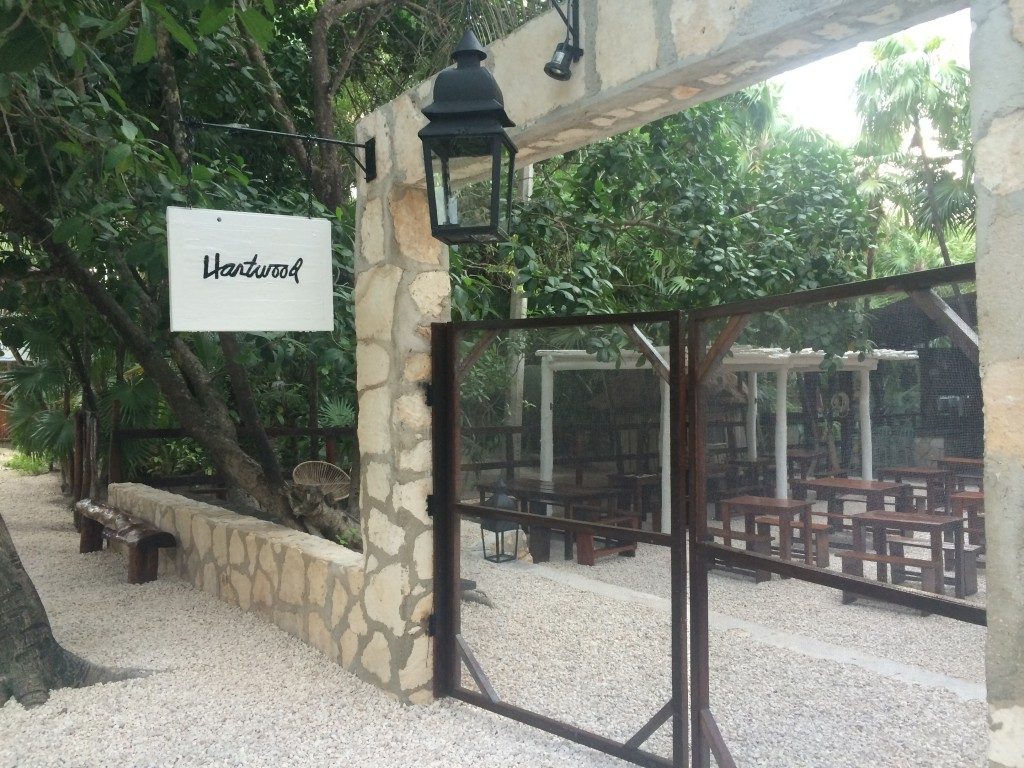← Back
Eric Werner, Owner Hartwood Tulum
Interview, 13 February 2015
In 2008, Eric Werner and his wife Mya Henry were in the midst of their respective (and highly successful) careers within the cut-throat environment of the New York City restaurant business. Werner as a celebrated chef at both Peasant in downtown Manhattan and Vinegar Hill House in Brooklyn, while Henry held a job at SoHo Grand Hotel.

In 2009 however – they both decided to part with their lives in the city and brought their skills, experience and sense of taste to Mexico’s Yucatan peninsula, looking for adventure and a new challenge.
Today, both in their mid-thirties, they are the joint owners of Hartwood, one of the most frequented and talked about restaurants in the chic beach town of Tulum on the southern part of the Mayan Riviera.
At Hartwood, prospective patrons have to line up in the late afternoon, sacrificing a much-needed siesta after a day in the sun, to reserve a table for the evening. The ones lucky enough to secure a spot will be given the chance to eat great food while observing Werner and his colleagues at work in the open kitchen facing the dining area.
The small, open-air establishment is packed every night, serving their specialties such as Pork Ribs and Whole Grouper Fish to around 120 guests in a timeless setting illuminated by antique kerosene lamps and lit candles.
Eric Werner grew up in rural upstate New York and developed a sense for sustainability and respect for eco-farming at an early age. As a result, Hartwood barely uses any electricity, depending on a single generator and solar panels to power the few appliances that need it and relying on open fire stoves and grills to do the rest. The ingredients used are sourced from local farms and markets and the restaurant brakes down their waste with zero carbon footprint creating a 100 percent organic compost.
Werner has always emphasized that he was never out to emulate Mayan cooking traditions, but rather to use its rich influences to compliment his already existing skills and culinary experience.
Breaking up from conformity and starting over in a new environment can be just as liberating and exciting as it can be challenging, but it nonetheless helps us develop as human beings and often gives those who dare try a new perspective on life. Something we all should aspire to try at least once.
We caught up with Eric Werner to hear more about relocating to the charming chaos of Mexico, setting up a successful business in a tricky logistical environment and why they chose the Yucatan to become their new home.
You grew up around agricultural surroundings in upstate New York, how much did that influence your ambition to become a chef?
– I was influenced very much by my surroundings and it taught me a great respect for true organic farming and all the work that it entails.
How did you end up making the decision to leave New York and relocate to the Yucatan?
– The decision was brought forward by a desire to explore and learn from the Mayan Communities within the Yucatan as this is where true agroforestry is in perfect harmony.

What was the experience of starting up a restaurant from scratch in unchartered waters in a foreign country like? What were some of the biggest challenges you faced?
– In the beginning, there were challenges everywhere and each day was harder than the last. It really pushed us to become stronger than we thought we could become. There were many people who helped us set it all up and we still work with these people after five years in Tulum. Unchartered waters are always exciting and they still are in my opinion.
“In the beginning, there were challenges everywhere and each day was harder than the last. It really pushed us to become stronger.”
What is it about Mayan food culture that appeals to you in particular?
– The food culture down here has a lot to do with companion farming on the Milpa (crop-growing system/farm, commonly found in the Yucatan) and that is what starts the seasonal ingredients and how they are used. For example corn, beans and squash are all grown together in harmony, it only makes sense to carry over that harmony into our cooking.

How do you go about scouting for locally grown raw ingredients?
– Many hours on the road every single day, navigating through the Mayan jungle and visiting local markets and farms.
How much did environmental sustainability weigh in when you created Hartwood?
– Honestly, one hundred percent of each move we made when building Hartwood had to do with environmental sustainability.

Your restaurant is the busiest in a town packed with exciting restaurants mostly run by expats, is there a fierce competitive edge to running a business in Tulum or is there a familiar vibe between different establishments?
– I don’t feel there is any unhealthy competitiveness around here. We are all trying our best to give the customer as great of an experience as possible.
So, what is it that you miss the most about living in NYC?
– Maya and I both love NYC and at the same time we both really love the Yucatan. I’ll have to say we enjoy both of these places wherever we find ourselves…
For more please visit:
http://www.hartwoodtulum.com